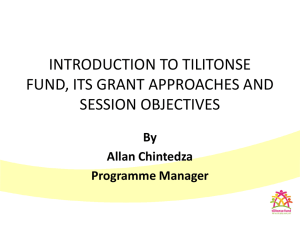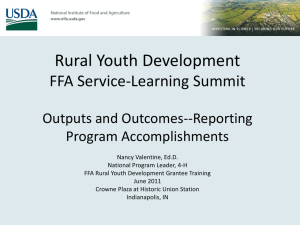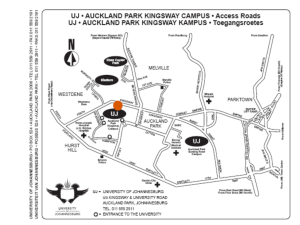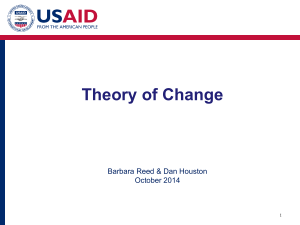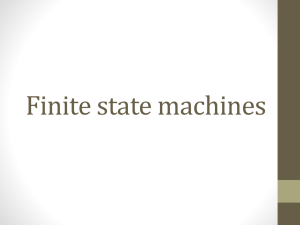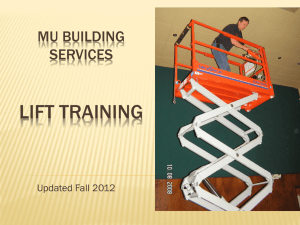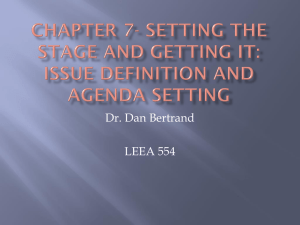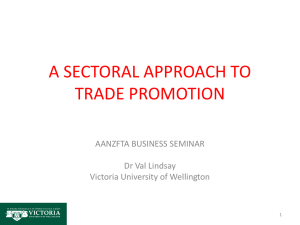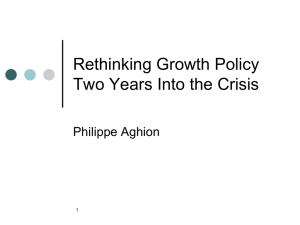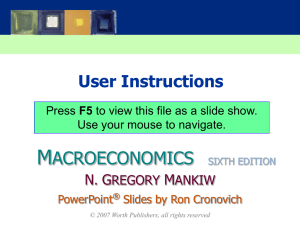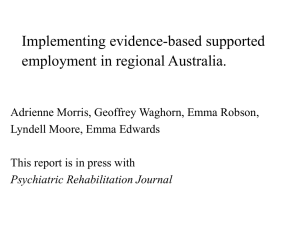in English - Livelihoods and Food Security Trust Fund
advertisement
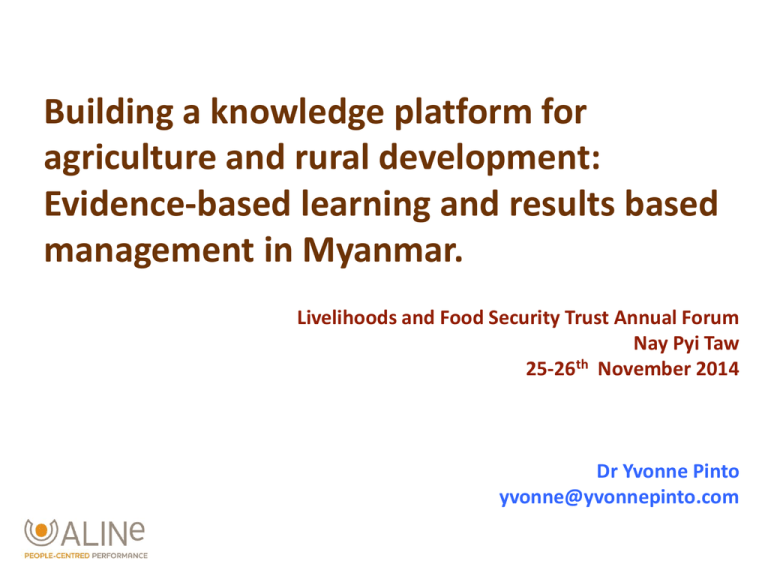
Building a knowledge platform for agriculture and rural development: Evidence-based learning and results based management in Myanmar. Livelihoods and Food Security Trust Annual Forum Nay Pyi Taw 25-26th November 2014 Dr Yvonne Pinto yvonne@yvonnepinto.com Overview • A knowledge platform? • Knowledge Management and M&E • Learning about what: defining the learning agenda • Results framework, TOC and M&E • Evaluations and research studies • A digital knowledge platform • Enabling evidence-based learning 2 Knowledge Management and M&E Monitoring and Evaluation • Measurement and interpretation of the outputs, outcomes and impacts of an intervention • Focus on the data itself • Emerges from an accountability paradigm Knowledge management • Knowledge as a resource focusing on how it is produced, shared and applied (or lost, misused) in diverse organisational or institutional settings • About people, their relationships and what they can do with data • Emerges from a learning and performance paradigm • M&E and KM are different yet complementary. M&E can be the foundation for structured primary evidence about the extent to which an intervention is achieving what it set out to achieve. • KM can help to ensure that the data gets translated into learning – i.e. new understanding and new ways of working – in service of strategic goals. A knowledge platform? Internal: • • • • External: Ensure that implementing partners, and • Engaging the broader network of key internal stakeholders are engaged in development partners, particularly the a robust, evidence-based learning government but also donors and other process. implementing organisations outside of Ensuring a robust and systematic M&E LIFT in the learning process; framework is in place to build the • Formulating sectoral learning agendas, evidence base in relation to the learning participating in various learning agenda; activities: Building the capacity, skills and Sectoral working group meetings knowledge of implementation partners and COPs in a manner that helps them learn from Periodic progress review each other and improve their meetings, meetings at the Fund performance in line with LIFT objectives. and board levels and with Government will occupy a position that strategic straddles inside and outside as it steering/management/technical increasingly becomes an active partner in committees. both the implementation and learning • Emphasis on ensuring that external processes. actors will be part of the learning process and will have ownership of the evidence generated. Learning about what? Defining a learning agenda Whose learning? Who defines the agenda? Results Framework, TOC and M&E A Theory of Change articulates how those involved in a change process understand how change takes place. In particular it: • Articulates a common vision of change for a specific system • Defines the actors and explores their role in contributing to specific changes • Traces the casual pathways that connect activities, to outputs and various levels of outcomes (including unintended outcomes) • Identifies the internal and external factors that can (enable, constrain) shape the change process • Clarifies the assumptions that must hold in order for the change process to hold together A results framework spells out the activities, outputs, outcomes and goal/vision of a programme/intervention. • A results framework is more of a performance measurement tool than a learning tool. Results Framework, TOC and M&E The LIFT Results Framework defines specific outputs and outcomes (i.e. changes) that LIFT seeks to contribute to. It serves as: • An accountability tool for establishing reporting commitments (upward to donors and from IPs below) • A planning tool for framing programme level strategies • A tool for organizing evidence to support Knowledge management Results Framework, TOC and M&E External/commissioned evaluations of programmes and research studies on key themes to validate internal M&E and answer specific evaluation and learning questions Robust internal M&E by IPs provides evidence about what works, what does not, to what extent, under what conditions. Helps to answer programme and relevant sectoral learning questions. LIFT TOC & Results Framework defines higher-level outcomes/outputs for programme level outcomes/outputs. 1. Individual Implementing Partners contribute to specific programme level outputs/outcomes through their activities. 2. IPs carry out routine M&E in a systematic manner on the basis of programme TOCs and their own interventions. Knowledge portal An online repository of evidence organised by: • Outcomes/Thematic area • Livelihood strategies/pathways • Geographic region • Types of use/user Content: • Progress against outcomes • Case studies of specific interventions • Syntheses of lessons learned by IPs through internal M&E (programme/sector-specific) • Syntheses of insights in relation to learning agendas through thematic workshops • Robust external evaluations on LIFT/programme performance to identify scaleable solutions, opportunities for improvement and risks, challenges to be addressed • Selected research studies to deepen understanding of key issues Enabling Evidence Based Learning 1. Common formulation of TOCs to create a common vision and define outcomes and programme-specific learning agendas 1. Defining learning agendas • Myanmar-level • Livelihood strategies • Programme level • Sectoral/thematic 2. Conducting robust internal and external M&E within a shared, structured framework 1. Creating and maintaining an online knowledge portal 1. Creating learning mechanisms and events • Opportunities for wider network of knowledge users to participate in governance and shape learning agendas • Communities of practice • Programme and sectoral synthesis workshops and reports • Capacity development

